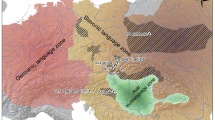Abstract
This article examines the Syeikh Muhammad Abduh's ideas on society, diagnoses of its problems and viable solutions. Central to this article's argument is the appropriation of Abduh into the list of thinkers found within the discipline of sociology that has been dominated by Europeans in his era. By highlighting several themes related to the challenges and anxieties faced by Muslim societies in facing up to Western modernity, which Abduh was much concerned with in his discourses, it is hoped that future scholars would re-examine his sociological thoughts in light of its significance towards fostering East–West intellectual symbiosis.
Similar content being viewed by others
Notes
A. Nabil Khoury, Islam and Modernization in the Middle East: Muhammad Abduh, An Ideology of Development, (USA: State University of New York, 1976), p. 17.
Albert Hourani, Arabian Thought in the Liberal Age: 1798–1939, (Cambridge: Cambridge University Press 1983), p. 140.
For a detailed and update discussion on sociological thought and theory see Bert N. Adams and R.A. Sydie, Sociological Theory, (Thousand Oaks: Pine Forge 2001).
Hourani, Arabian Thought in the Liberal Age, p. 151.
Khoury, Islam and Modernization in the Middle East, p. 2.
See Max Weber, The Protestant Ethic and the Spirit of Capitalism (trans. by Talcott Parsons), (New York: Allen & Unwin,1976).
Khoury, Islam and Modernization in the Middle East, p. 5.
Ibid., p. 63.
Muhammad Abduh, The Theology of Unity (Great Britain: Unwin Brothers Ltd, 1966), p. 7.
Hourani, Arabian Thought in the Liberal Age, p. 151.
Karl Marx, Critique of Hegel's ‘Philosophy of Right’ (trans. by Annette Jolin and Joseph O'Malley, (London: Cambridge University Press, 1970).
Khoury, Islam and Modernization in the Middle East, p. 92.
Yvonne Haddad, Muhammad abduh: Pioneer of Islamic Reform, in Ali Rahnema (ed.), Pioneers of Islamic Revival, (Kuala Lumpur: Abdul Majeed and Co, 1995), p. 560.
Ibid., p. 58.
Khoury, Islam and Modernization in the Middle East, p. 21.
Ibid., p. 29.
Haddad, Muhammad Abduh, p. 53.
Osman Amin, Muhammad Abduh, (USA: Edwards Brothers, 1953), p. 31.
19Ibid., p. 29.
Khoury, Islam and Modernization in the Middle East, p. 35.
Amin, Muhammad Abduh, p. 94.
References
Abduh M (1966) The theology of unity. Unwin Brothers Ltd, Great Britain
Adams BN, Sydie RA (2001) Sociological theory. Thousand Oaks: Pine Forge
Amin O (1953) Muhammad Abduh. Edwards Brothers, USA
Hourani A (1983) Arabian thought in the liberal age: 1798–1939. Cambridge University Press, Cambridge, pp 1798–1939
Marx K (1970) Critique of Hegel's ‘Philosophy of Right’ (trans. by Annette Jolin and Joseph O'Malley). Cambridge University Press, London
Nabil KA (1976) Islam and modernization in the Middle East. In: Muhammad Abduh (ed): An Ideology of Development. State University of New York, USA
Rahnema A (1995) Pioneers of Islamic Revival. Abdul Majeed, Kuala Lumpur
Weber M (1976) The Protestant ethic and the spirit of capitalism (trans. by Talcott Parsons). Allen & Unwin, New York
Author information
Authors and Affiliations
Corresponding author
Rights and permissions
About this article
Cite this article
Aljunied, S.M.K. Western sociology and the Muslim world. AEJ 3, 421–427 (2005). https://doi.org/10.1007/s10308-005-0012-8
Published:
Issue Date:
DOI: https://doi.org/10.1007/s10308-005-0012-8




